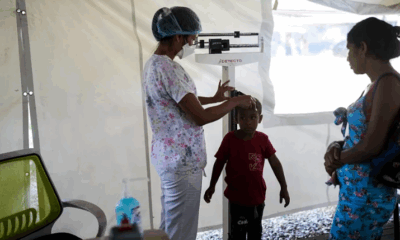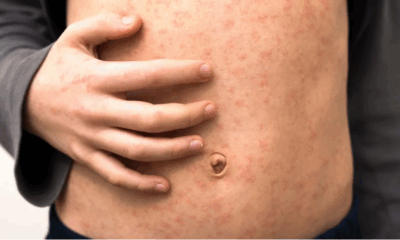Health
Experts Weigh in on Dry January and the Health Risks of Alcohol Consumption
As the new year begins, many are considering the “Dry January” challenge, which involves abstaining from alcohol for the month. Experts highlight that reducing alcohol consumption is a key step toward improving health, debunking previous beliefs about the benefits of moderate drinking.
Dr. Timothy Naimi, director of the Canadian Institute for Substance Use Research at the University of Victoria, emphasized the risks associated with alcohol. “Drinking less is a great way to be healthier,” he said, adding that alcohol consumption is linked to several cancers, including colon, liver, breast, mouth, and throat cancers.
Alcohol metabolizes into acetaldehyde, a substance that can damage cells and hinder their repair processes, creating conditions for cancer development. Thousands of deaths in the U.S. could be prevented annually if people adhered to dietary guidelines that recommend men limit themselves to two drinks per day and women to one.
U.S. Surgeon General Dr. Vivek Murthy recently called for updating health warning labels on alcoholic beverages to include cancer risks, a proposal that would require Congressional approval. “As you consider whether or how much to drink, keep in mind that less is better when it comes to cancer risk,” Murthy wrote on social media platform X.
Reevaluating the “Moderate Drinking” Myth
The notion that moderate drinking benefits heart health stems from flawed studies that compared drinkers to non-drinkers without accounting for key variables such as education, income, and access to healthcare. Once these factors are adjusted, the supposed benefits largely disappear, Dr. Naimi explained.
Another issue is the age demographic studied. Most research focused on older adults who survived middle age without developing alcohol-related problems, creating a skewed perception of benefits for moderate drinkers. Nearly half of alcohol-related deaths occur in individuals under 50, highlighting the dangers of drinking at younger ages.
Genetic studies further challenge the benefits of alcohol. Research comparing individuals with a gene variant that makes drinking unpleasant to those without it found that people with the variant, who tend to drink little or none, have a lower risk of heart disease.
Global Shift Toward Drinking Less
Countries like the United Kingdom, France, and Australia have recently updated their alcohol guidelines, recommending lower consumption levels based on growing evidence linking alcohol to over 200 health conditions. Starting in 2026, Ireland will require cancer warning labels on alcoholic beverages.
“The scientific consensus has shifted due to the overwhelming evidence linking alcohol to cancers, cardiovascular diseases, and injuries,” said Carina Ferreira-Borges of the World Health Organization.
While the U.S. did not adopt stricter alcohol guidelines in 2020, experts like Dr. Naimi stress the importance of moderation. “The simple message supported by evidence is that, if you drink, less is better when it comes to health,” he said.
Health
Europe Pays Less for Medicines Than the U.S., but Prices Still Vary Widely by Country
Health
Global Nurse Shortage Worsened by European Reliance on Foreign Healthcare Workers, WHO Warns
Health
Early-Onset Cancer Rates Rising in U.S., But Deaths Mostly Stable, Study Finds

A new U.S. government study has revealed that while cancer diagnoses among people under 50 are on the rise, the overall death rates for most types of cancer in this age group remain stable.
Published Thursday in the journal Cancer Discovery, the study is one of the most comprehensive assessments to date of early-onset cancers, analyzing data from more than two million cases diagnosed in Americans aged 15 to 49 between 2010 and 2019.
The findings show that 14 out of 33 cancer types had increasing incidence rates in at least one younger age group. The most significant increases were seen in breast, colorectal, kidney, and uterine cancers. Women accounted for about 63 percent of the early-onset cases.
“This pattern generally reflects something profound going on,” said Tim Rebbeck of the Dana-Farber Cancer Institute, who was not involved in the study. “We need to fund research that will help us understand why this is happening.”
The study found that, compared to 2010 data, there were 4,800 more breast cancer cases, 2,000 additional colorectal cancers, 1,800 more kidney cancers, and 1,200 extra uterine cancers by 2019.
Despite the rising numbers, researchers emphasized a key reassurance: death rates for most of these cancers are not increasing. However, exceptions were noted—colorectal, uterine, and testicular cancers saw slight rises in mortality among younger adults.
The causes behind the rise in early-onset cancers are not fully understood. The study’s datasets do not include information on potential risk factors such as obesity, lifestyle, or access to healthcare. However, researchers, including lead author Dr. Meredith Shiels of the National Cancer Institute, highlighted obesity as a possible driver.
“Several of these cancer types are known to be associated with excess body weight,” said Dr. Shiels. She also pointed to advances in detection and changing screening practices as possible contributors to earlier diagnoses.
Breast cancer trends may also be influenced by shifting reproductive patterns, such as women having children later in life, which has been associated with increased cancer risk due to fewer years of pregnancy and breastfeeding—factors known to lower risk.
Not all cancer types followed the upward trend. Rates of more than a dozen cancers, including lung and prostate cancer, are decreasing among younger people. Researchers attribute the lung cancer decline to reduced smoking rates, while updated PSA screening guidelines are likely behind the drop in prostate cancer diagnoses.
Experts plan to convene later this year to further investigate the growing early-onset cancer burden and explore targeted prevention strategies.
-

 Business12 months ago
Business12 months agoSaudi Arabia’s Model for Sustainable Aviation Practices
-

 Business12 months ago
Business12 months agoRecent Developments in Small Business Taxes
-

 Politics12 months ago
Politics12 months agoWho was Ebrahim Raisi and his status in Iranian Politics?
-

 Business10 months ago
Business10 months agoCarrectly: Revolutionizing Car Care in Chicago
-

 Business11 months ago
Business11 months agoSaudi Arabia: Foreign Direct Investment Rises by 5.6% in Q1
-

 Technology12 months ago
Technology12 months agoComparing Apple Vision Pro and Meta Quest 3
-

 Politics12 months ago
Politics12 months agoIndonesia and Malaysia Call for Israel’s Compliance with ICJ Ruling on Gaza Offensive
-

 Sports9 months ago
Sports9 months agoKeely Hodgkinson Wins Britain’s First Athletics Gold at Paris Olympics in 800m






























